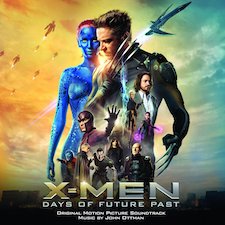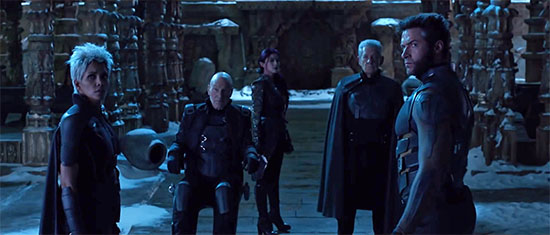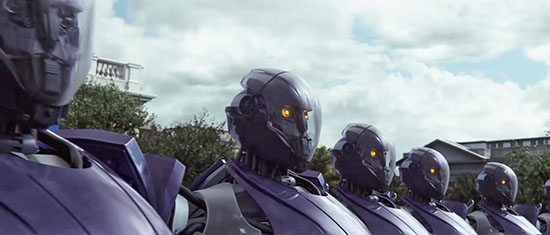
 BUY FROM AMAZON: CLICK HERE!
BUY FROM AMAZON: CLICK HERE!
MSRP $9.99
LABEL Sony Masterworks
RUNNING TIME 76 Minutes
AVAILABLE ON VINYL? No
Like many comic book film franchises, X-Men’s musical history is rich with things that haven’t worked. On the first film, Bryan Singer didn’t have his editor/composer/pal John Ottman by his side, and while I can’t be 100% sure, I’m willing to bet it was at the behest of Fox. This was Singer’s first time driving a 75 million dollar car around the block, so he was going to work with whomever they “suggested”. There were three editors on that film, and the late Michael Kamen provided an uncharacteristically weak score. Singer hasn’t worked with any of those editors again, and after the success of X-Men, Singer was able to bring back his pal John Ottman to edit and score X2: X-men United. To this day, X-Men remains the only theatrical feature directed by Bryan Singer that is missing the collaboration of John Ottman. Ottman’s work on X2 was more robust and spirited than Kamen’s, but a bit messy.
Composer John Powell was brought in to score Brett Ratner’s X-Men: The Last Stand, and I can’t be bothered to remember a goddamn thing about that movie, except that Powell’s score didn’t quote any of the previous themes, but it didn’t stray too far from the established precedent. Harry Gregson-Williams supplied the score for X-Men Origins: Wolverine, and as soon as I finished that film I took an adamantium bullet to the head, or least that’s what my friends tell me. I’ve forgotten most of what I knew about that film, and I plan on keeping it that way. Marco Beltrami scored James Mangold’s highly superior The Wolverine, and his score was okay.
The only X-Men score to date that has really moved me is Henry Jackman’s score for X-Men: First Class. Jackman’s simple themes were a perfect fit for the sixties secret agent vibe that First Class carried. His main theme works just as well during the fun training montage as it does during moments of huge drama and spectacle, like when Magneto is able to lift Sebastian Shaw’s submarine. It’s a score I still listen to regularly, which I can’t say for any of the previous ones.

Now, with the return of director Bryan Singer, we’ve got our first returning composer for the franchise. If you’re itching to hear the main theme from X2 again, you’re in luck. While it’s not used heavily in the film, the theme makes a triumphant return in The Future – Main Titles, which is the album’s opening track. As expected, you’ll hear it reprised in Welcome Back – End Titles.
Almost everything else in Ottman’s score for Days of Future Past sounds new. The most frequently quoted new theme is Hope (Xavier’s Theme), which we first hear in a melancholy, bleak iteration. It sounds almost funereal in the track He Lost Everything, but as the film progresses, we hear the theme striving to be more hopeful, as heard in All The Voices. Keep listening for this theme, and you’ll hear it everywhere in the score. Like Xavier himself, this is the thematic anchor of the entire film.
What of Magneto, though? Surely there must be something for him. Well there is, but it’s brief, and it’s weird. At the end of Time’s Up (Film Version), you’ll hear a reference to Henry Jackman’s Magneto theme, which was totally unexpected but very welcome. The theme isn’t directly quoted (possibly for legal reasons), but it’s so freakin’ close that it can’t be mere coincidence.
The use of these themes in the score is certainly welcome, but I really do wish we got some more identifiable motifs for the characters, especially Wolverine. He’s never had a single motif that I can hum from memory, and since he’s the franchise mainstay, that’s really disappointing. Also, there’s no theme for the Sentinels that I can identify. Perhaps after I see the film I’ll get some more context, but the film’s actions cues are mostly devoid of identifiable leitmotifs. Instead, we get a lot of punchy taiko-esque percussion, electric guitar feedback, and horror movie string shrieks. The action cues aren’t unexciting, but most of them lack a signature X-Men sound. There’s also a lot of stealthy tension-building cues, which contain some occasional drops of Mystique. She gets a slow and delicate Tubular Bells-esque theme, which feels very period appropriate.

My last comment about this soundtrack album is that I hear some sloppy playing, particularly when the orchestra plays the rousing main title theme. In that theme, there’s a fast little arpeggio that lots of instruments have to play simultaneously, and it never lines up. It’s always mushy and poorly articulated. It’s not the fault of the musicians, really. It’s more of a problem with the film scoring process, which is typically very rushed. There’s not a whole lot of time for rehearsal, and rehearsal is the only way to smooth out things like that. As someone who grew up playing in concert bands, orchestras, and jazz bands, I know. I’d have an aneurysm if I had to play this kind of stuff without rehearsal.
All in all, John Ottman’s return to the X-Men franchise was a better move than bringing in yet another composer, but I want to hear some themes that are as strong and identifiable as these characters. They’ve been onscreen for almost fifteen years now, and they deserve it. Xavier’s theme is a step in the right direction, but there’s a lot more than can be done in the future. Let’s hope that X-Men: Apocalypse continues this trend. X-Men: Days of Future Past – The Original Motion Picture Soundtrack is currently available for digital download, and will get a CD release on June 3.
Rating: 




Out of a Possible 5 Stars
UPDATE: I’ve just gotten back from the film, and I can say I’m quite pleased with it. However, I need to address a few things in my soundtrack review. First, the supposed use of Henry Jackman’s Magneto theme is not what it seems. Ottman’s cue Time’s Up (Film Version) is used during the film’s first Sentinel attack with Bishop, Kitty Pryde, Warpath, Iceman, and Blink. The end of that cue sounds very similar to Jackman’s theme, and follows nearly the same chord progression, but Magneto himself has nothing to do with the scene.
Also, the “Tubular Bells-esque” cue that I had previously attributed to Mystique is used during the scene when Xavier, Beast, and Wolverine are planning an infiltration of The Pentagon. Mystique does get her own motif, and it appears on the album in a track called How was She.